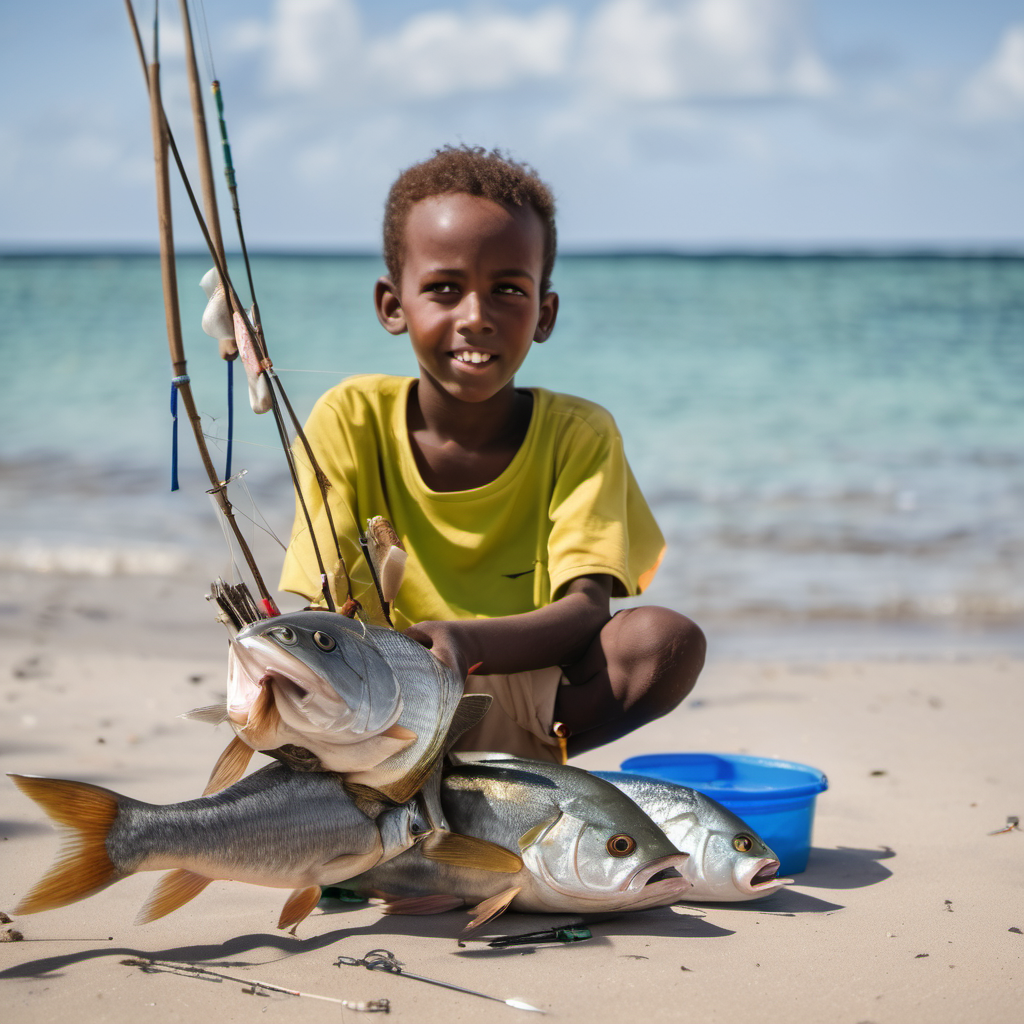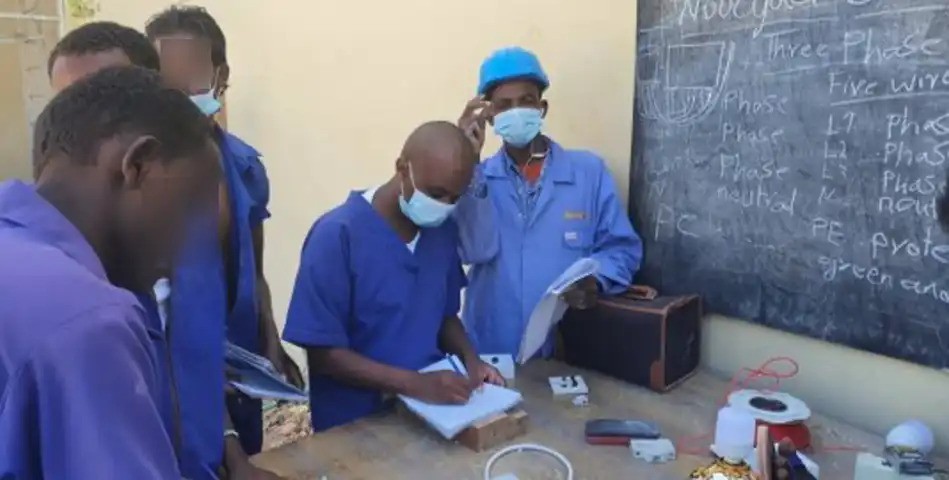UNODC Eastern Africa News and Stories
You are here: Home / News
Piracy and Me: My Redemption Story
 As a young boy, Malik Ali dreamed of being a fisherman because of the profound connection he felt with the sea. Growing up in a coastal village in Somalia, he spent countless hours watching the fishermen set sail at dawn, their boats disappearing into the horizon, only to return later in the day with their catch. He listened to stories from fishermen about their adventures and big catches, and it made him want to be part of that world. He did realize the dream of becoming a fisherman, but financial difficulty eventually led him down a more nefarious path at sea.
As a young boy, Malik Ali dreamed of being a fisherman because of the profound connection he felt with the sea. Growing up in a coastal village in Somalia, he spent countless hours watching the fishermen set sail at dawn, their boats disappearing into the horizon, only to return later in the day with their catch. He listened to stories from fishermen about their adventures and big catches, and it made him want to be part of that world. He did realize the dream of becoming a fisherman, but financial difficulty eventually led him down a more nefarious path at sea.
“My journey into piracy began out of sheer desperation. As a fisherman in a coastal village, I faced relentless hardship. The sea, once a source of sustenance, turned against us with dwindling fish stocks and mounting debts. Each day was a struggle to keep food on the table for my family, and whispers of a more lucrative life grew louder. The allure of ransom money, the promise of escaping poverty, became too tempting to resist.
 “Joining a pirate crew felt like a thrilling adventure at first. The joy of the pirate life was intoxicating. We navigated the open seas with a sense of freedom I'd never known. The camaraderie among the crew was genuine, bound by a shared quest for wealth. We hijacked ships and secured ransoms, which brought an influx of money I could only dream of as a fisherman. For a while, the spoils of piracy allowed us to live lavishly. We experienced the thrill of outsmarting authorities and the rush of successful raids. This life seemed glamorous and exciting, a stark contrast to the grinding poverty of my previous existence.
“Joining a pirate crew felt like a thrilling adventure at first. The joy of the pirate life was intoxicating. We navigated the open seas with a sense of freedom I'd never known. The camaraderie among the crew was genuine, bound by a shared quest for wealth. We hijacked ships and secured ransoms, which brought an influx of money I could only dream of as a fisherman. For a while, the spoils of piracy allowed us to live lavishly. We experienced the thrill of outsmarting authorities and the rush of successful raids. This life seemed glamorous and exciting, a stark contrast to the grinding poverty of my previous existence.
“My life took a life-altering turn during a naval operation when I was captured and accused of piracy. Facing the grim reality of severe punishment, I found myself imprisoned in Seychelles, a world away from everything I had known. During my years in the Seychelles prison, I endured the mental and emotional toll of being far from home and family. After several years, I was transferred back to Somalia to complete the remainder of my sentence.
 “Upon my transfer to a Somali prison, I enrolled in the UNODC's rehabilitation and reintegration programme. The programme focused on addressing the root causes of incarceration, such as poverty and lack of education. We were given access to psychological support to deal with the trauma and guilt of our actions. Vocational training, including computer literacy and welding courses, were key components. These courses aimed to provide us with viable alternatives to piracy, ensuring we had the means to support ourselves and our families once we were released legally. This approach aligns with the Nelson Mandela Rules, which emphasize that all prisoners matter and deserve humane treatment and opportunities for rehabilitation. The programme's dedication to addressing underlying issues and providing practical skills embodies the spirit of these rules, affirming the belief that every individual has the potential for change and reintegration into society.
“Upon my transfer to a Somali prison, I enrolled in the UNODC's rehabilitation and reintegration programme. The programme focused on addressing the root causes of incarceration, such as poverty and lack of education. We were given access to psychological support to deal with the trauma and guilt of our actions. Vocational training, including computer literacy and welding courses, were key components. These courses aimed to provide us with viable alternatives to piracy, ensuring we had the means to support ourselves and our families once we were released legally. This approach aligns with the Nelson Mandela Rules, which emphasize that all prisoners matter and deserve humane treatment and opportunities for rehabilitation. The programme's dedication to addressing underlying issues and providing practical skills embodies the spirit of these rules, affirming the belief that every individual has the potential for change and reintegration into society.
“After completing the programme, I was determined to start anew. I established my own legitimate business with the skills acquired during my rehabilitation. Now, I preach to the people of Somalia that they should not go down the piracy route. I share my story, highlighting the dangers and consequences of piracy and emphasising the importance of choosing lawful means to earn a living.”
The work of UNODC in the corrections sector in Somalia represents a crucial component of efforts to promote the rule of law and human rights in the country. By providing technical assistance and capacity-building support to improve prison conditions and rehabilitation programmes, UNODC plays a vital role in contributing to sustainable peace and security in Somalia. These efforts include actively involving the local community. Community members, recognized for their invaluable expertise, are engaged as trainers, instilling skills and a sense of mutual understanding and respect between prisoners and their communities. This sense of shared responsibility is a key element of UNODC's approach, making the entire community feel included in the process of rehabilitation and reintegration.
In addition, through inclusive and participatory community forums, UNODC orchestrates dialogue. By uniting diverse job sectors from education and healthcare to business and social services, UNODC catalyzes collaborative strategies for effectively reintegrating prisoners into society. This approach not only restores individuals to a path of productivity and dignity but also forges enduring bonds within the community.
For more information, please contact:
Mr. David O’Connell (David.OConnell@un.org)
Western Indian Ocean Programme Coordinator
Global Maritime Crime Programme
United Nations Office on Drugs and Crime
Click here to visit the UNODC Global Maritime Crime Programme website.